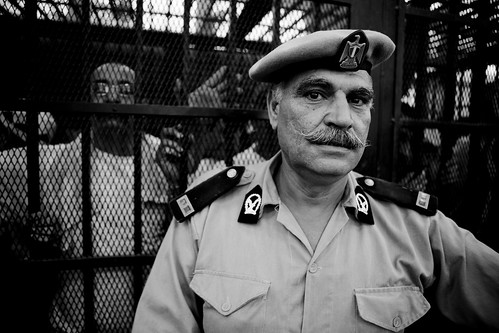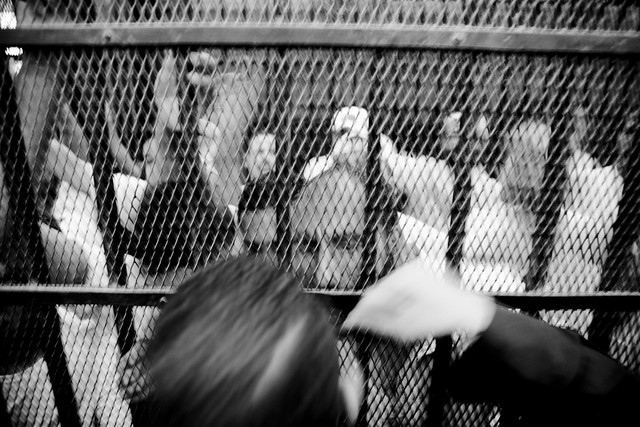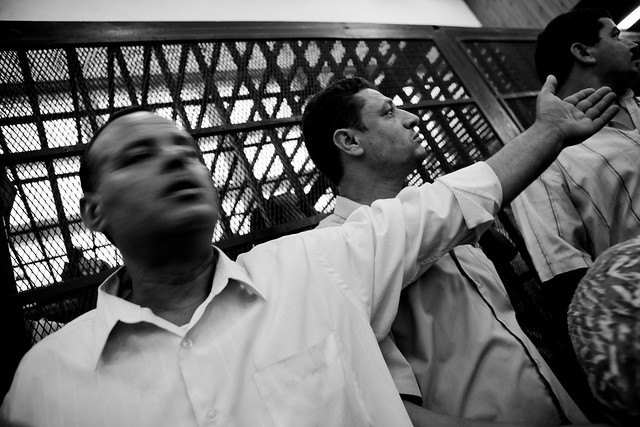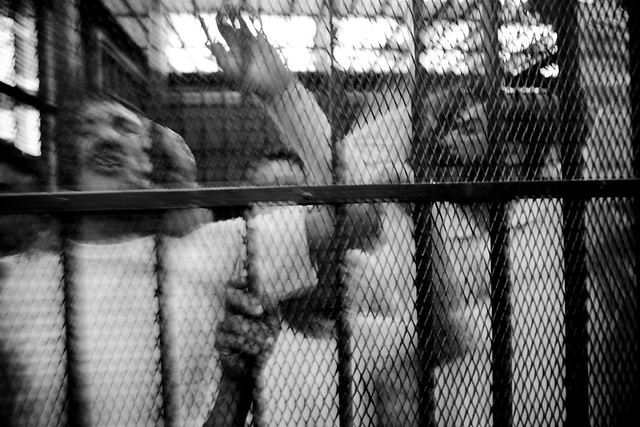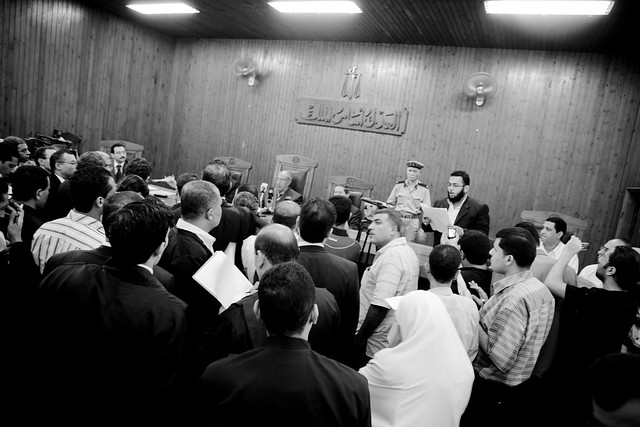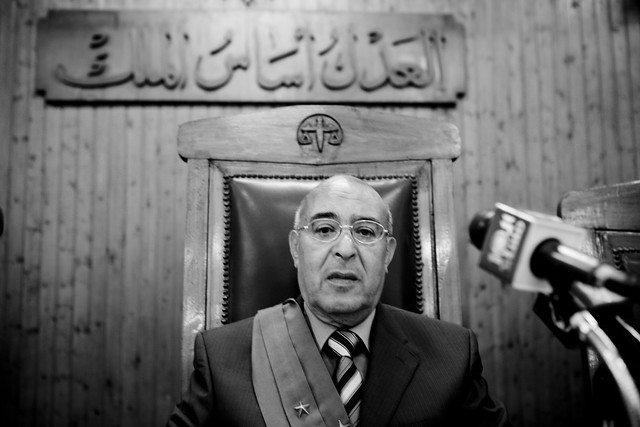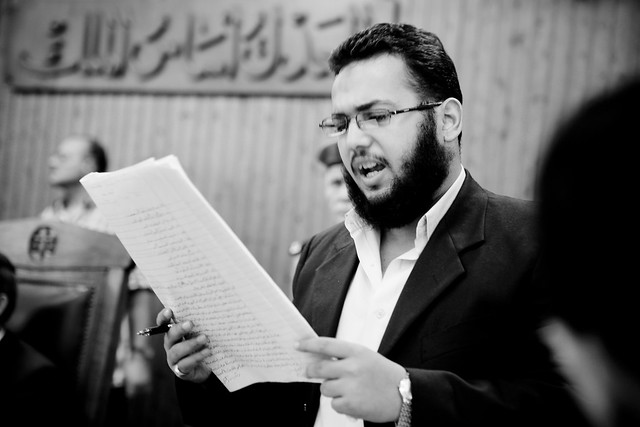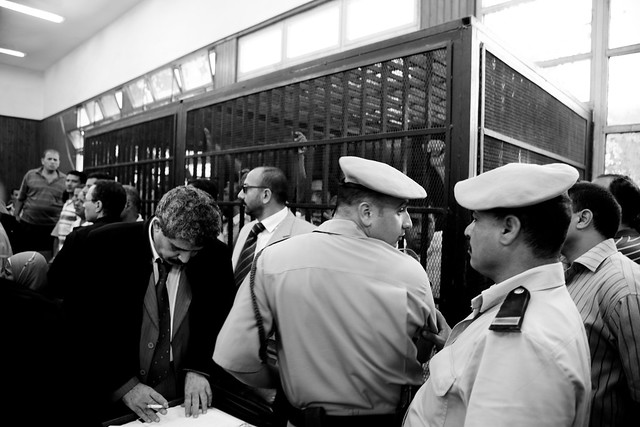Today, in Tanta, the Mahalla 49 trial has been adjourned to tomorrow. I’ll post more photos and a report later.
Tag: gharbeia
Trip to Tanta: The Mahalla 49 Trial
I traveled to Tanta on Saturday morning to try to attend the Mahalla 49 trial.
Tight security and heavy police presence around Tanta's court building on the 1st day of the Mahalla 49 trial
— عمو حسام (@3arabawy) August 9, 2008
As soon as I arrived in the city’s train station, I was shocked by the heavy security presence around Tanta’s Court which is literally few steps away from the station. At least four police trucks full of soldiers were parked in front of the court’s gate, and I don’t know how many else I didn’t spot, but it’s safe to assume even double the number in the side streets, with the level of security paranoia on that day.
The families of the prisoners were not allowed to attend the trial and were crunched into some side alley. Shops surrounding the court building were told by the police to shut down on the trial day. The court building itself swarmed with dozens of high-ranking officers, dressed in trendy suits without ties, from Mahalla’s First and Second Police Station, accompanied with a good number of morshedin (informers) and corporals in plainclothes with guns sticking out of their pants. That’s in addition to the plainclothes State Security police officers and their men.
The court’s restaurant waiters, who are usually buzzing around the corridors with cups of coffee and tea, were also told to take a rest and not step into the part of the building that housed the trial. Lawyers themselves found it difficult to make their way, but they finally did after dictating their names to various plainclothes and uniformed police corporals who were taking the names down in repeated lists. Photographers, journalists and TV crews had to do the same at a later stage, after an initial cold shoulder from the police.
“Are you a member of Kefaya?” asked one of the morshedin who was writing down my name (probably for the third time by then). I denied of course, so he turned to my colleague and asked him the same. It seemed this was some procedural question before one entered into the court room.
Those inside the court room where either families and lawyers in cases that were to be looked into by the same judges who would try the Mahalla detainees, uniformed and plainclothes police, journalists.
A little after 11am, we started hearing shouts from outside the courtroom: “We want Justice! God help us! We are innocent!” The Mahalla prisoners had arrived and were due to show up in the court cage. The Judges left the room, while the police escorted the other prisoners whose cases have been looked into already out of the cage. More plainclothes police officers and informers got inside the room. It was clear there were a bunch of generals too of high position, whom I didn’t know. But they were on the mobile phone talking most of the time in whispers, while other younger police officers were running around them like obedient dogs. A firefighter was also brought into the room and stood throughout the trial in the back corner besides a fire extinguisher. I have never seen something like this in any of the trials I attended before. Was the police expecting someone to set himself on fire, or throw a bomb?!
As the Mahalla prisoners were let into the cage, the court room turned chaotic. Photographers and cameramen jumped on the seats, stepping on people’s heads and shoulders to try to get a shot at the prisoners, journalists with their notebooks and pens trying to keep their balance while taking down notes of the event and shout questions at the prisoners in the cage. Defense lawyers, who had rare access to their clients and most of whom did not even posses a copy of the court case files, were trying to speak to the prisoners through the bars…
while security kept trying to empty the seats next to the cage of anyone, and surrounded the cage trying to prevent interviews and block the view for the cameras.
Yet, the Mahalla prisoners’ voices could still be heard. There were 25 of them in the cage, shrieking saying they were innocent, they were “good citizens,” and that the police had fabricated charges against them, torturing them to get confessions. I had already come across some of the stories of the abuse in custody, but to hear them from the prisoners themselves in such a melodramatic atmosphere was honestly very upsetting and troubling.
Prisoners said they were forced to strip naked, as the police subjected them to electric shocks on their lips, hands, breasts, genitals and feet. Others said after they were stripped, the police brought in dogs and threatened the detainees with rape by the animals! That is of course in addition to the usual slaps, kicks, beatings they were welcomed with in Mahalla’s 1st and 2nd Police Stations, as well as in Mahalla’s and Tanta’s State Security police offices.
Some of the detainees also said the police were trying to force them into “confessing” the Muslim Brotherhood was behind the uprising. During times when security wasn’t looking, the prisoners passed the names of the police officers involved in their torture:
Haitham el-Shamy
Ahmad el-Sherbiny
Muhammad Saleh
Ayman el-Qadi
Amr el-Harouni
Muhammad Saqr
Hossam el-Ghareeb
Some of the above mentioned names were present in the court room, according to the prisoners. For some reason, all the police officers were dressed in either blue or brown suits, without ties. They all had this look on their faces.. Hostility and arrogance… They were reeking of arrogance and sense of power and authority. At some point earlier when I was trying to get into the court room before the trial started, one of those senior officers, Salah Basha, asked to see my National ID card. I gave it to him, and he took it, had a look at it, and was flipping it carelessly and dropped it on the floor. He didn’t kneel down to get it of course, showed no sign something has happened and just looked the other way and started a new conversation with one of his colleague, while I bent down to pick it up from the dusty floor before it gets squashed under somebody’s feet. This was just a simple little example, but I could just feel the vibes of arrogance flooding from Salah Basha and his colleagues. They were largely Criminal Investigation officers, not State Security police, based in Mahalla. They did not speak much to us, except giving orders and instructions. Their lower ranking morshedin were on some occasions more chatty. I sat besides one of them and had a few mins chat during the break. He was dressed in a cheap light shirt, and dark pair of trousers, bold with a mustache. He was from Mahalla and had been working in the Criminal Investigations service for five years now.
“All these are criminals,” he said pointing at the Mahalla prisoners in the cage. “We have files on them. They are guilty… The situation, it’s true, is bad in the country at the moment, but those on the top are doing their best. That’s our fate. Things are bad. If they could have been better, they would have. But no that’s the case. Those on top, whether they are perfect or not, that’s not my issue. God will judge them. It’s not my duty to judge them. It’s God’s.
“Strikes and demonstrations will destroy the country under the current conditions. The situation is exploding and if the people take to the streets they will destroy everything. Look at what the mob did in Mahalla. They destroyed telephone cabins and shops.
“I was in Mahalla before, during and after the (April Uprising) events. State Security had said there would be a strike in the factory, and this had to be stopped. We were getting ready on the ground to squash it at least a week before it was scheduled. (On the 6th of April) we sent out more cars and microbuses on all the transportation lines between Mahalla and other villages and towns from where the workers come. Everyone had to come to work. We made sure no agitation happened in bus stations and that the cars and buses that carry the workers were moving smoothly.”
The chat was interrupted, and the mourshid stood up after his senior waived for him to stop talking and move closer to the court cage. I noticed then for the first time the gun sticking out of his pants.
The lawyers gathered around the judges in the usual scene of any Egyptian trial, where you don’t hear what the judges are saying nor the lawyers, unless you yourself jump into that crowd somehow and fight your way similar to the crowds around bakeries.
Every now and then the judge would shout to assert his authority and control on the room. Silence would fall for few mins, and then it’s back crescendo style to a bazaar mood.
A court official read out the accusations in a gahouri voice.
… followed by the prosecutor demanding the “harshest sentences” for the prisoners. The judge shouted. at the prisoners: “What do you say about those accusations?”
“We are innocent!” shouted the prisoners back, as the room fell into chaos again. “We swear by God we didn’t do anything! Fabrications! Lies!”
The lawyers registered their presence with the court, demanding the trial be adjourned since they did not have enough time to look into the case files. They also made other demands including the release of their clients pending the trial.
The cage included 25 prisoners: 24 of them were already in police custody based on orders from the prosecutor, locked up in Bourg el-Arab Prison. Another prisoner was added. His name is Baher Said Hamed el-Domiati. He is among a group of 11 defendants who were detained and then released on prosecutor’s order, yet their names were included in the case. Acting against the advise of lawyers, Baher’s father told his son to show up for the court. A group of nine more prisoners did not appear in court, but they are in police custody after they received a detention decree from Mubarak’s Interior Minister General Habib el-Adly. Five more defendants are on the run. [So to do the math: 24 + 11 + 9 + 5 = 49 Mahalla defendants]
After a recess, the judges came back, dashing the lawyers’ hopes. The presiding judge adjourned the trial to 1 September, but refused to release the prisoners, and moreover ordered the police to take into their custody the group of 11 defendants the prosecutor had ordered their release (including the young lad Baher, whose dad pushed him to show up)!
The lawyers went outside the court fuming. There were some women relatives who managed somehow to get into the building by then, but still were not allowed into the court. One of them grabbed my hand on my way out to ask me for what happened inside. I told her the trial was adjourned and gave her the date. We were standing then, literally, in a water pool. The janitors of the building, acting obviously at the behest of the police, flooded the floor outside the courtroom and started sweeping.. to prevent anyone from assembling in the building.
Outside the building, Baher’s father, dressed in a grey galabiya passed out and was lying on the pavement after he heard the judges’ orders from the lawyers. He had a hysterical fit, then dropped in the street. He was carried away by a Police Special Forces captain to clear the road.
